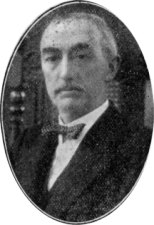
[From IoM Examiner Annual 1927]

The Manx people are already congratulating themselves upon the arrival in the Island last April, of Sir Claude Hill, K.C.S.I., in the capaicty of Lieutenant-Governor. Not only is His Excellency possessed of exceptional natural gifts, and of knowledge gained from experience in many branches of public administration; but every public appearance of his confirms the impression that here is a well-informed, widely-travelled, alert, and agreeable than of the world, and yet one whom the passing of the vears has not robbed of idealism. ilis Excellency's proposals with reference to the Imperial contribution may still be the subject of controversy, but no one will question his rapid and complete mastery of the Island's economic conditions, his financial resourcefulness, his independence, and his irresistible combination of frankness and persuasiveness. His Excellency was born in 1866, and his distinguished career in the Indian Civil Service began in 1887. He has held the offices of Under Secretary to the Government of India (Home Department) ; First Assistant Resident at Hyderabad; private secretary to the Governor of Bombay; Deputy Secretary to the Government of India (Foreign Department) ; political secretary to the Governor of Bombay; Resident at Mewar; Agent to the Governor at Kathinwar; member of the Executive Council of Bombav, and finally, Finance Member of the Viceroy's Executive Council, and head of the Central Transport and Food Board of India. He retired in 1921, and became Director-General of the League of Red Cross Societies, with headquarters at Paris, an office which he held until his appointment to the Isle of Man.
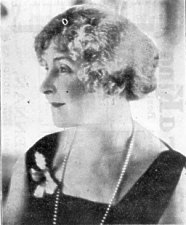
The warm esteem which the new Governor has already won for himself among the Manx community, is shared by his thoroughly gracious and charming helpmeet. Lady Hill was formerly Miss Frances May West, daughter of Sir Raymond West, and was married to His Excellency in 1892. Sir Claude and she have a son and two daughters, the younger of whom resides with her parents at Government House.
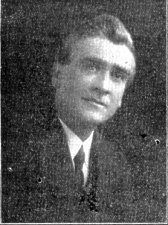
whose portrait appears above, has been superintendent of the Douglas Primitive Methodist circuit since July, 1925. He is steeped in the traditions of Primitive Methodism having been born at Tunstall, Staffordshire, in the immediate vicinity of which town the place of that historic first camp meeting, Mow Cop, is situated. He was formerly engaged in the teaching profession, and became a student at the Hartley Theological College in 1899. He passed his probation as a minister in the Berwick-on-Tweed circuit, and spent the next fourteen years in Scottish circuits, mainly in the Glasgow area. Later on, he was stationed at Amble, in Northumberland, and next at Nottitngliam (Hayfield Grove circuit), in the centre of a large industrial population, which lie left to take up duty at Douglas. He has held the responsible office of G.C.D. (General Committee Delegate) in the Scottish district and the Nottingham district. He has been president of the Nottingham and District Brotherhood Federation, and is president-elect of the I.o.M. Christian Endeavour Union.
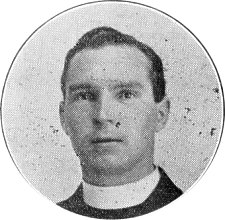
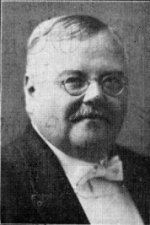
has been musical director at The Palace since 1902, and for ten years prior to that date he had held a similar position; at Derby Castle. His connection in Douglas dates from 1885 when he was solo violinist and leader in the Falcon Cliff orchestra, under Mr Edgar Ward. In 1887, he transferred his allegiance to Derby Castle, and served under Mr Edward de Jong, a very celebrated flautist, Mr Charles Reynolds, who obtained fame upon the oboe, and Mr Stocks Hammond. There was an interval in which he was engaged by the management of The Palace, which opened in 1889, and responded to the baton of Mr Fred Vetter. In 1892, as already indicated, he, was appointed conductor at Derby Castle. In 1917,,wlien the Douglas amusement resort, were closed because of the war,he went to the Winter Gardens, Blackpool, as musical director, and since 1910 he has discharged that responsibility both at Douglas and Blackpool. At the Sunday concerts given weekly in The Palace during the visiting season, the world's most eminent vocal and instrumental soloists haye performed almost times without number; but there never was a concert of them all when the orchestra gave a, less refined artistic pleasure than the vocalists. Mr Wood is the brother of the brilliant young composer Haydn Wood, who has achieved immense popularity without sacrificing artistry.
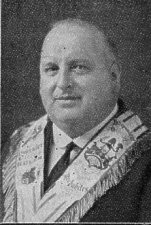
was last April elected District Chief Ruler in the Independent Order of Rechabites. Mr Radcliffe's interest in Rechabitism is hereditary, for his maternal grandfather, the late Mr Robert Faragher, of Peel (uncle of the late Dr. R. Cregeen Faraker), was the first secretary of the Star of Mona Tent, which was founded in1837. It was in the room of the same Tent with which his grandfather was so actively associated that Mr Radcliffe last year received the highest Honour which it was in the power of his Manx brethren to bestow. His father, the late Mr John Radcliffe, of Derby-road, Douglas, was also a Rechabite, and the subject of the present notice has since his childhood been a member, first of the Mona Union Tent (Douglas), and then of the North Douglas Tent since its foundation. He was secretary of the latter Tent for some time, and is now a trustee, and lie has laboured with especial zeal for the inculcation of the principles of total abstinence and thrift among the juveniles. Mr Radcliffe is well-known in Douglas and throughout the Island as secretary of S. H. Broadbent & Co., Ltd., in whose service he has been engaged for the past twenty-five years,
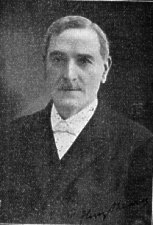
The pastorate of the Baptist Church, Broadway, Douglas, has been accepted by Rev. J. Fleming Shearer, of Liverpool. The rev. gentleman is a native of Glasgow, and was educated at Glasgow University. His first church was at Middlesborough, and the happy relations which he established there are witnessed by the fact that many years later, he received a pressing invitation to return to his first love. He next went to Bromley, near London, and later to the Ladbroke Grove church, Notting Hill, definitely within the great metropolis. There, also, he inspired his congregation with such affection and confidence that when he received a call to a church at Bristol, they would not bear of his leaving them, and he yielded to their entreaties. On that, occasion testimonies to Mr Shearer's gifts and Character were paid by the late Dr. Clifford and the late Dr. Silvester Horne. He carne to Liverpool in 1906. The Dovedale-road church was built, but Mr Sliearer had to find and form his church membership, and to create his organisations. Now the church is live and progressive, attracting large numbers of young people, running numerous and flourishing organisations, and free of debt.
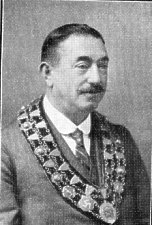
is this year's Grand Master in the Isle of Man District of the Oddfellows. He was born in Ramsey, where his f:ather. Mr Daniel Callow, still lives, but for the last twenty-two years he has been a responsible employee of the Castletown Brewery Co., Ltd.; not to put too fine a point on it, he superintend the brewing. He has made himself exceedingly popular in his adopted town, and has interested himself in all matters of sociial activities. He is chairman of the Castletotown Association Football Club, and has been for some years; he is an active spririt in the Castown regattas, and in all manner of healthful sports; he is a tenor singer of uncommon sweetness, and a member of the choir of Castletown Parish Church, and of the Castletown Choral Society; and he has taken part in amateur dramatic performances given locally. For three years he has been a warden in the Parish Church, or, as it was styled until recently, St. Mary's Government Chapel. He is a Mason, and is at present Senior Deacon in the Mona Lodge. A few weeks ago he was elected a member of the Castletown Town Commissioners, of which body his brother, the late Mr Daniel Teare Callow, was at one time chairman.
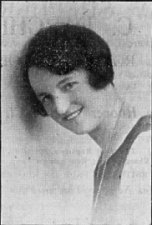
Manx people experienced a rare thrill of pleasure on the evening of Tynwald Day last, when over the ether came the sounds of their own national songs sung by their own sweetest singer. A Manx programme was wireless-ed from the broadcasting station at Manchester, and Miss May Clague - Manx people invariably call her by that name, and then pull themselves up, remembering that correctly she is Mrs R. H. Bridson - was asked to contribute the vocal numbers. Miss Clague possesses one of the loveliest soprano voices the Isle of Man ever produced. The first of her numerous musical triumphs was achieved at the age of 14, when under the tuition of the late Mr J. D. Looney, she won the first prize in the open soprano solo class at the Manx Music Festival. She became the soprano gold medallist for four years in succession, and won in the special music festival organised as part of the June effort in 1911, open to the United Kingdom. In the following year she gained second prize in the Blackpool Festival, losing the premier place by only one mark. During the Great War, she toured the South of England for a whole year, singing continually at camp concerts and in hospitals andconvalescent homes, and she won her way into the hearts of of British lads in khaki or blue.
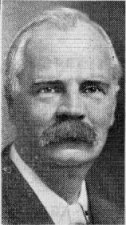
The President of the Wesleyan Methodist Conference for the year 1926-7 is of Manx descent, and is related to quite a number of well-known Manx people. Mr. Maltby, who is 60 years old, is a son of the late Rev. W. Maltby, who before his admission into the Wesleyan ministry carried on business as a baker at the corner of Drumgold-street and Market-street; his grandfather, Mr Thomas Maltby, was a woollen manufacturer at Union Mills, and his grandmother was a member of the well-known family of Karran, of Ballingan, Marown. Dr. Maltby was born while his father was stationed in a Scottish circuit, and was educated at the Kingswood school for the sons of Wesleyan ministers, near Bristol. He entered the engineering trade, but later qualified as a solicitor, and practised at Pallark. so, comparatively speaking, it was late in life when he became a candidate for the ministry. He had a useful career in various circuits up and down the Kingdom, and a few years ago was appointed warden of the Wesley Deaconess Institute, Ilkley. He steadily rose in the esteem and affection of his brother ministers, and his presidential address last July, and his guidance of the Conference during some momentous discussions, such as that on Methodist Union, have been acclaimed as stamping him one of the ablest and most influential occupants of John Wesley's chair. He was sent by the Conference as a deputation to visit the missionary stations in Africa and India during the years 1923 and 1924; he takes an active part in the Student Christian movement; lie is widely known in churches other than those of his own connexion, having several times preached, among other places, in the City Temple.
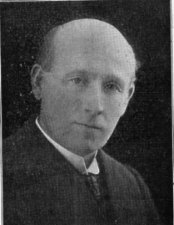
is a brother of the late Mr T. H. Cormode, H.K. and has twice sought the suffrages of the Rushen electors, in the Labour interest; he is an ex-president of the Manx Labour Party, and with his brother, the late Mr Ben Cormode, was among the founders of the Manx Socialist Society. He has taken an active interest in the local politics of the parish of Malew, where (at the little hamlet of St. Mark's) he carries on business as a smith. He is a vice-president of the I.o.M. Football Association, and until recently, together with Mr T. Taggart, was secretary of the Southern District Agricultural Society: His independence, honesty, goodwill, and sanity are highly valued in every organisation to which he belongs.
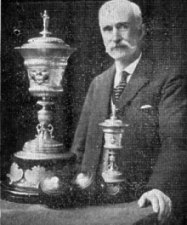
|
|
||
| |
||
|
|
||
| Any comments, errors or omissions gratefully received The
Editor HTML Transcription © F.Coakley , 2007 |
||